An Analysis of Motivating Factors in Hotel Management Careers
VerifiedAdded on 2019/12/03
|24
|8639
|474
Report
AI Summary
This report delves into the motivating factors that influence individuals to pursue careers in hotel management. It begins with an introduction outlining the background, rationale, aim, objectives, and research questions. The literature review explores current trends in the UK hotel industry, different theories of motivation, and motivational factors influencing career choices. The research methodology section details the research type, design, philosophy, approach, data collection methods, sampling techniques, and data analysis. The report also includes a discussion of validity, reliability, and limitations. The study aims to assess current trends, determine motivational factors, and provide recommendations for career development in hotel management. The report covers key aspects of the hospitality sector, including employment opportunities, financial growth, and the evolving perceptions of the industry. The structure of the dissertation includes chapters on introduction, literature review, research methodologies, data analysis and findings, and conclusions and recommendations. The literature review includes secondary sources such as books, journals and research papers which develop deeper insight among the researcher about the subject area. The report is structured to provide a systematic investigation of past studies and scholarly papers relevant to the topic.
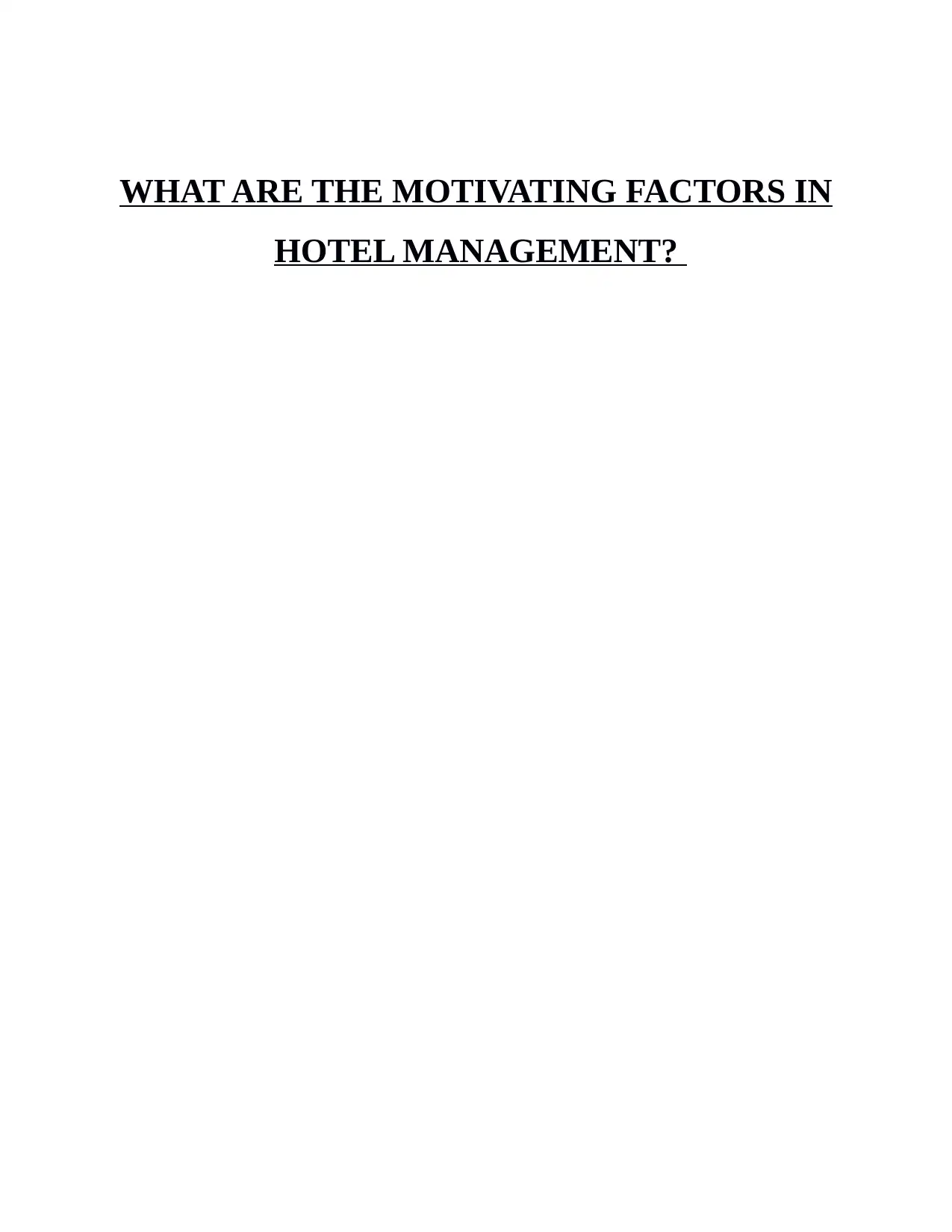
WHAT ARE THE MOTIVATING FACTORS IN
HOTEL MANAGEMENT?
HOTEL MANAGEMENT?
Paraphrase This Document
Need a fresh take? Get an instant paraphrase of this document with our AI Paraphraser
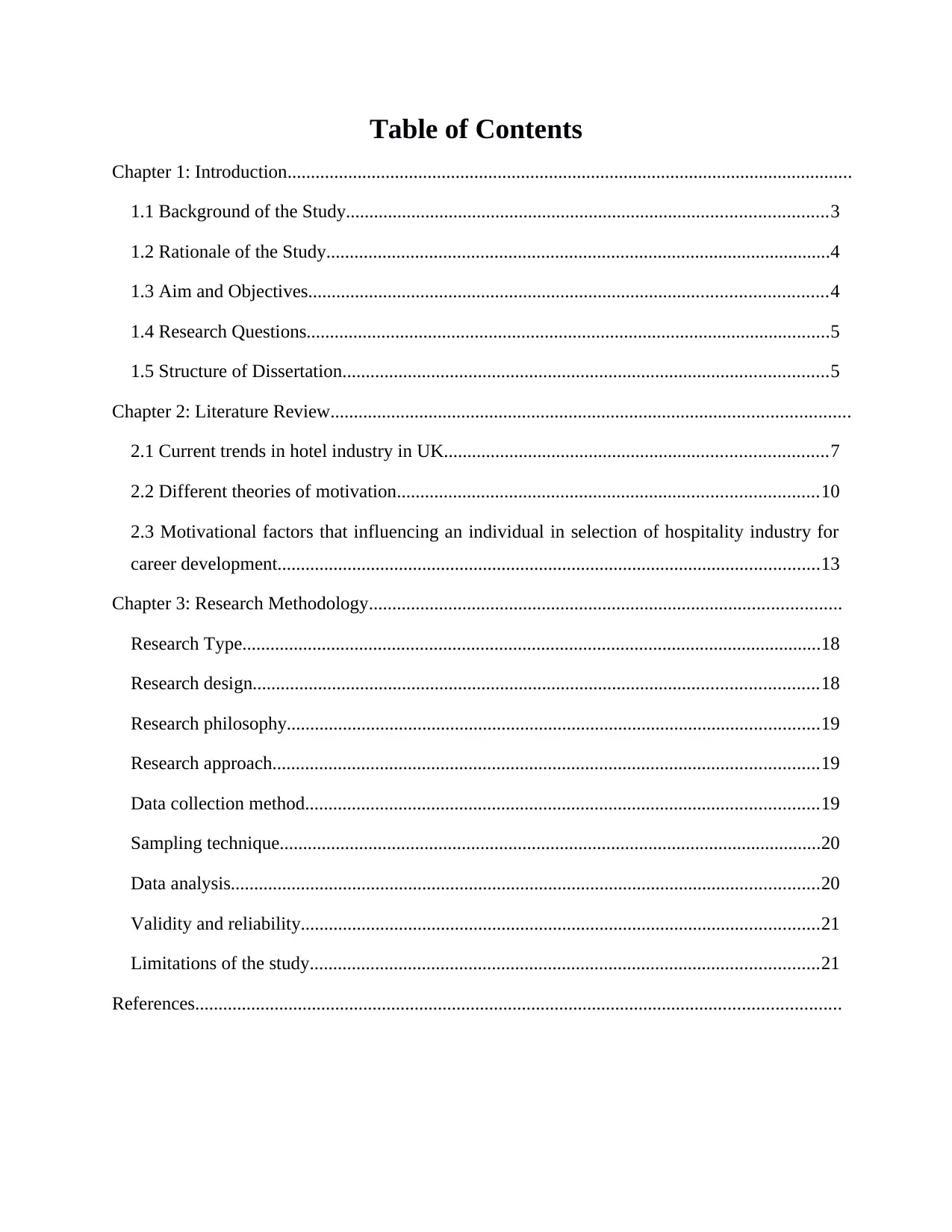
Table of Contents
Chapter 1: Introduction.........................................................................................................................
1.1 Background of the Study.......................................................................................................3
1.2 Rationale of the Study............................................................................................................4
1.3 Aim and Objectives...............................................................................................................4
1.4 Research Questions................................................................................................................5
1.5 Structure of Dissertation........................................................................................................5
Chapter 2: Literature Review...............................................................................................................
2.1 Current trends in hotel industry in UK..................................................................................7
2.2 Different theories of motivation..........................................................................................10
2.3 Motivational factors that influencing an individual in selection of hospitality industry for
career development....................................................................................................................13
Chapter 3: Research Methodology.....................................................................................................
Research Type............................................................................................................................18
Research design.........................................................................................................................18
Research philosophy..................................................................................................................19
Research approach.....................................................................................................................19
Data collection method..............................................................................................................19
Sampling technique....................................................................................................................20
Data analysis..............................................................................................................................20
Validity and reliability...............................................................................................................21
Limitations of the study.............................................................................................................21
References..........................................................................................................................................
Chapter 1: Introduction.........................................................................................................................
1.1 Background of the Study.......................................................................................................3
1.2 Rationale of the Study............................................................................................................4
1.3 Aim and Objectives...............................................................................................................4
1.4 Research Questions................................................................................................................5
1.5 Structure of Dissertation........................................................................................................5
Chapter 2: Literature Review...............................................................................................................
2.1 Current trends in hotel industry in UK..................................................................................7
2.2 Different theories of motivation..........................................................................................10
2.3 Motivational factors that influencing an individual in selection of hospitality industry for
career development....................................................................................................................13
Chapter 3: Research Methodology.....................................................................................................
Research Type............................................................................................................................18
Research design.........................................................................................................................18
Research philosophy..................................................................................................................19
Research approach.....................................................................................................................19
Data collection method..............................................................................................................19
Sampling technique....................................................................................................................20
Data analysis..............................................................................................................................20
Validity and reliability...............................................................................................................21
Limitations of the study.............................................................................................................21
References..........................................................................................................................................
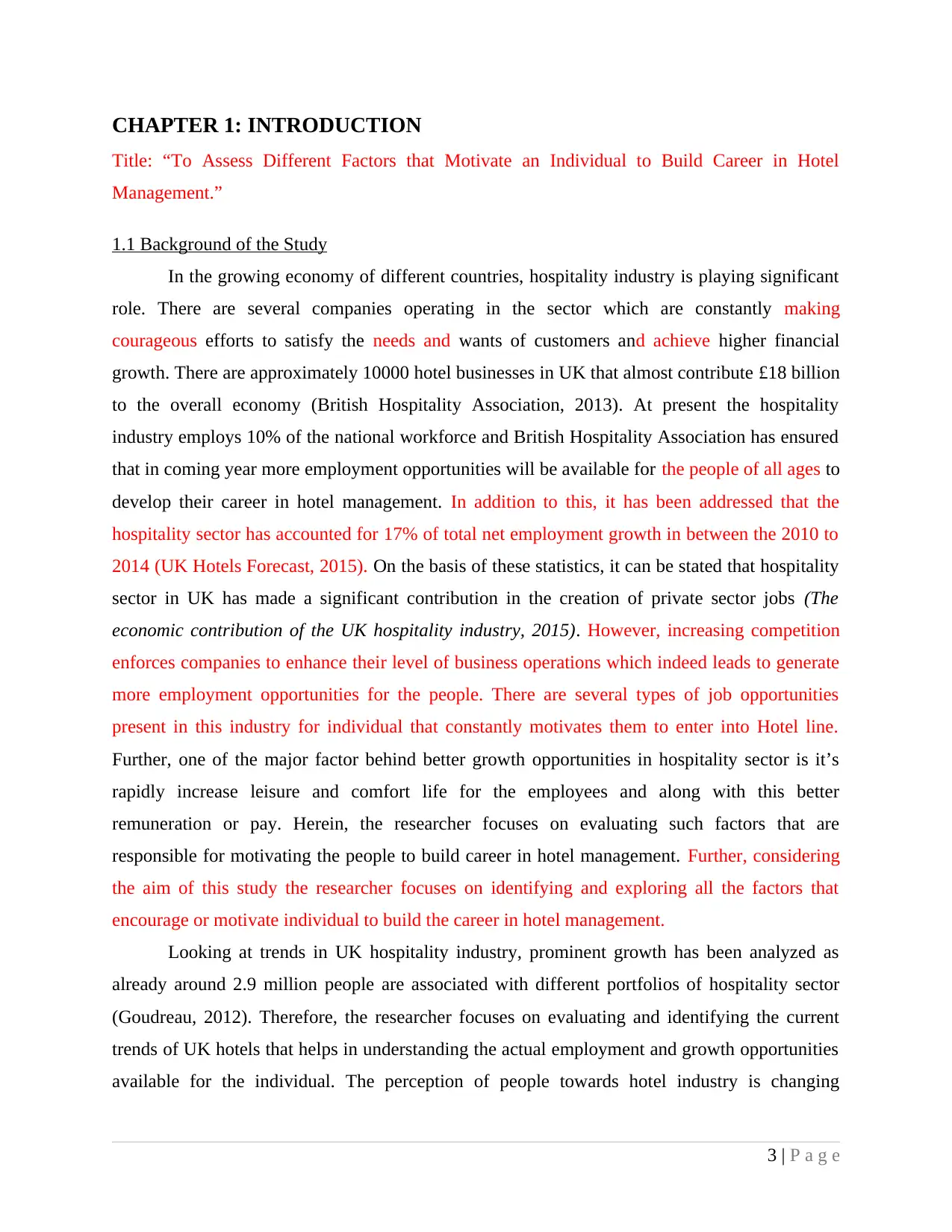
CHAPTER 1: INTRODUCTION
Title: “To Assess Different Factors that Motivate an Individual to Build Career in Hotel
Management.”
1.1 Background of the Study
In the growing economy of different countries, hospitality industry is playing significant
role. There are several companies operating in the sector which are constantly making
courageous efforts to satisfy the needs and wants of customers and achieve higher financial
growth. There are approximately 10000 hotel businesses in UK that almost contribute £18 billion
to the overall economy (British Hospitality Association, 2013). At present the hospitality
industry employs 10% of the national workforce and British Hospitality Association has ensured
that in coming year more employment opportunities will be available for the people of all ages to
develop their career in hotel management. In addition to this, it has been addressed that the
hospitality sector has accounted for 17% of total net employment growth in between the 2010 to
2014 (UK Hotels Forecast, 2015). On the basis of these statistics, it can be stated that hospitality
sector in UK has made a significant contribution in the creation of private sector jobs (The
economic contribution of the UK hospitality industry, 2015). However, increasing competition
enforces companies to enhance their level of business operations which indeed leads to generate
more employment opportunities for the people. There are several types of job opportunities
present in this industry for individual that constantly motivates them to enter into Hotel line.
Further, one of the major factor behind better growth opportunities in hospitality sector is it’s
rapidly increase leisure and comfort life for the employees and along with this better
remuneration or pay. Herein, the researcher focuses on evaluating such factors that are
responsible for motivating the people to build career in hotel management. Further, considering
the aim of this study the researcher focuses on identifying and exploring all the factors that
encourage or motivate individual to build the career in hotel management.
Looking at trends in UK hospitality industry, prominent growth has been analyzed as
already around 2.9 million people are associated with different portfolios of hospitality sector
(Goudreau, 2012). Therefore, the researcher focuses on evaluating and identifying the current
trends of UK hotels that helps in understanding the actual employment and growth opportunities
available for the individual. The perception of people towards hotel industry is changing
3 | P a g e
Title: “To Assess Different Factors that Motivate an Individual to Build Career in Hotel
Management.”
1.1 Background of the Study
In the growing economy of different countries, hospitality industry is playing significant
role. There are several companies operating in the sector which are constantly making
courageous efforts to satisfy the needs and wants of customers and achieve higher financial
growth. There are approximately 10000 hotel businesses in UK that almost contribute £18 billion
to the overall economy (British Hospitality Association, 2013). At present the hospitality
industry employs 10% of the national workforce and British Hospitality Association has ensured
that in coming year more employment opportunities will be available for the people of all ages to
develop their career in hotel management. In addition to this, it has been addressed that the
hospitality sector has accounted for 17% of total net employment growth in between the 2010 to
2014 (UK Hotels Forecast, 2015). On the basis of these statistics, it can be stated that hospitality
sector in UK has made a significant contribution in the creation of private sector jobs (The
economic contribution of the UK hospitality industry, 2015). However, increasing competition
enforces companies to enhance their level of business operations which indeed leads to generate
more employment opportunities for the people. There are several types of job opportunities
present in this industry for individual that constantly motivates them to enter into Hotel line.
Further, one of the major factor behind better growth opportunities in hospitality sector is it’s
rapidly increase leisure and comfort life for the employees and along with this better
remuneration or pay. Herein, the researcher focuses on evaluating such factors that are
responsible for motivating the people to build career in hotel management. Further, considering
the aim of this study the researcher focuses on identifying and exploring all the factors that
encourage or motivate individual to build the career in hotel management.
Looking at trends in UK hospitality industry, prominent growth has been analyzed as
already around 2.9 million people are associated with different portfolios of hospitality sector
(Goudreau, 2012). Therefore, the researcher focuses on evaluating and identifying the current
trends of UK hotels that helps in understanding the actual employment and growth opportunities
available for the individual. The perception of people towards hotel industry is changing
3 | P a g e
⊘ This is a preview!⊘
Do you want full access?
Subscribe today to unlock all pages.

Trusted by 1+ million students worldwide
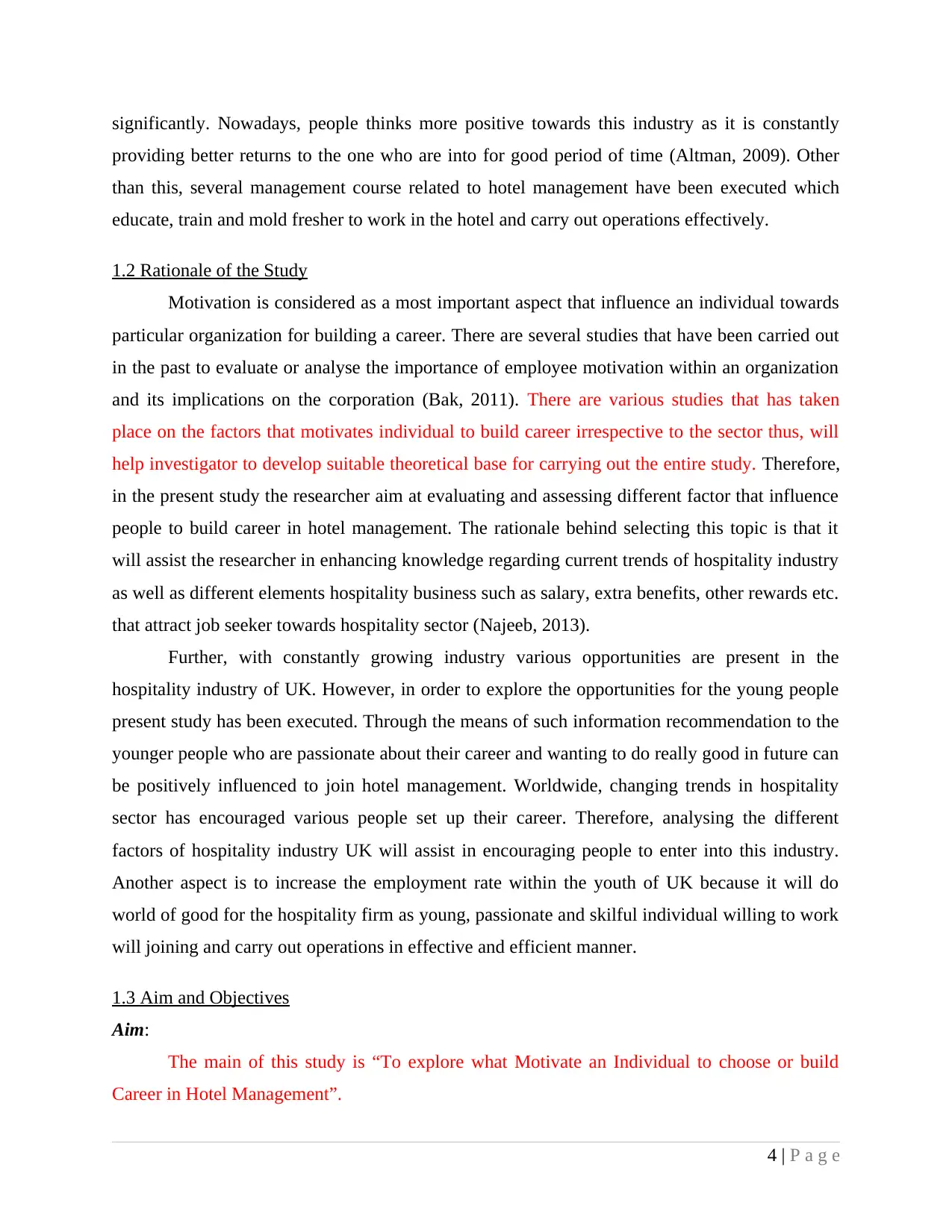
significantly. Nowadays, people thinks more positive towards this industry as it is constantly
providing better returns to the one who are into for good period of time (Altman, 2009). Other
than this, several management course related to hotel management have been executed which
educate, train and mold fresher to work in the hotel and carry out operations effectively.
1.2 Rationale of the Study
Motivation is considered as a most important aspect that influence an individual towards
particular organization for building a career. There are several studies that have been carried out
in the past to evaluate or analyse the importance of employee motivation within an organization
and its implications on the corporation (Bak, 2011). There are various studies that has taken
place on the factors that motivates individual to build career irrespective to the sector thus, will
help investigator to develop suitable theoretical base for carrying out the entire study. Therefore,
in the present study the researcher aim at evaluating and assessing different factor that influence
people to build career in hotel management. The rationale behind selecting this topic is that it
will assist the researcher in enhancing knowledge regarding current trends of hospitality industry
as well as different elements hospitality business such as salary, extra benefits, other rewards etc.
that attract job seeker towards hospitality sector (Najeeb, 2013).
Further, with constantly growing industry various opportunities are present in the
hospitality industry of UK. However, in order to explore the opportunities for the young people
present study has been executed. Through the means of such information recommendation to the
younger people who are passionate about their career and wanting to do really good in future can
be positively influenced to join hotel management. Worldwide, changing trends in hospitality
sector has encouraged various people set up their career. Therefore, analysing the different
factors of hospitality industry UK will assist in encouraging people to enter into this industry.
Another aspect is to increase the employment rate within the youth of UK because it will do
world of good for the hospitality firm as young, passionate and skilful individual willing to work
will joining and carry out operations in effective and efficient manner.
1.3 Aim and Objectives
Aim:
The main of this study is “To explore what Motivate an Individual to choose or build
Career in Hotel Management”.
4 | P a g e
providing better returns to the one who are into for good period of time (Altman, 2009). Other
than this, several management course related to hotel management have been executed which
educate, train and mold fresher to work in the hotel and carry out operations effectively.
1.2 Rationale of the Study
Motivation is considered as a most important aspect that influence an individual towards
particular organization for building a career. There are several studies that have been carried out
in the past to evaluate or analyse the importance of employee motivation within an organization
and its implications on the corporation (Bak, 2011). There are various studies that has taken
place on the factors that motivates individual to build career irrespective to the sector thus, will
help investigator to develop suitable theoretical base for carrying out the entire study. Therefore,
in the present study the researcher aim at evaluating and assessing different factor that influence
people to build career in hotel management. The rationale behind selecting this topic is that it
will assist the researcher in enhancing knowledge regarding current trends of hospitality industry
as well as different elements hospitality business such as salary, extra benefits, other rewards etc.
that attract job seeker towards hospitality sector (Najeeb, 2013).
Further, with constantly growing industry various opportunities are present in the
hospitality industry of UK. However, in order to explore the opportunities for the young people
present study has been executed. Through the means of such information recommendation to the
younger people who are passionate about their career and wanting to do really good in future can
be positively influenced to join hotel management. Worldwide, changing trends in hospitality
sector has encouraged various people set up their career. Therefore, analysing the different
factors of hospitality industry UK will assist in encouraging people to enter into this industry.
Another aspect is to increase the employment rate within the youth of UK because it will do
world of good for the hospitality firm as young, passionate and skilful individual willing to work
will joining and carry out operations in effective and efficient manner.
1.3 Aim and Objectives
Aim:
The main of this study is “To explore what Motivate an Individual to choose or build
Career in Hotel Management”.
4 | P a g e
Paraphrase This Document
Need a fresh take? Get an instant paraphrase of this document with our AI Paraphraser
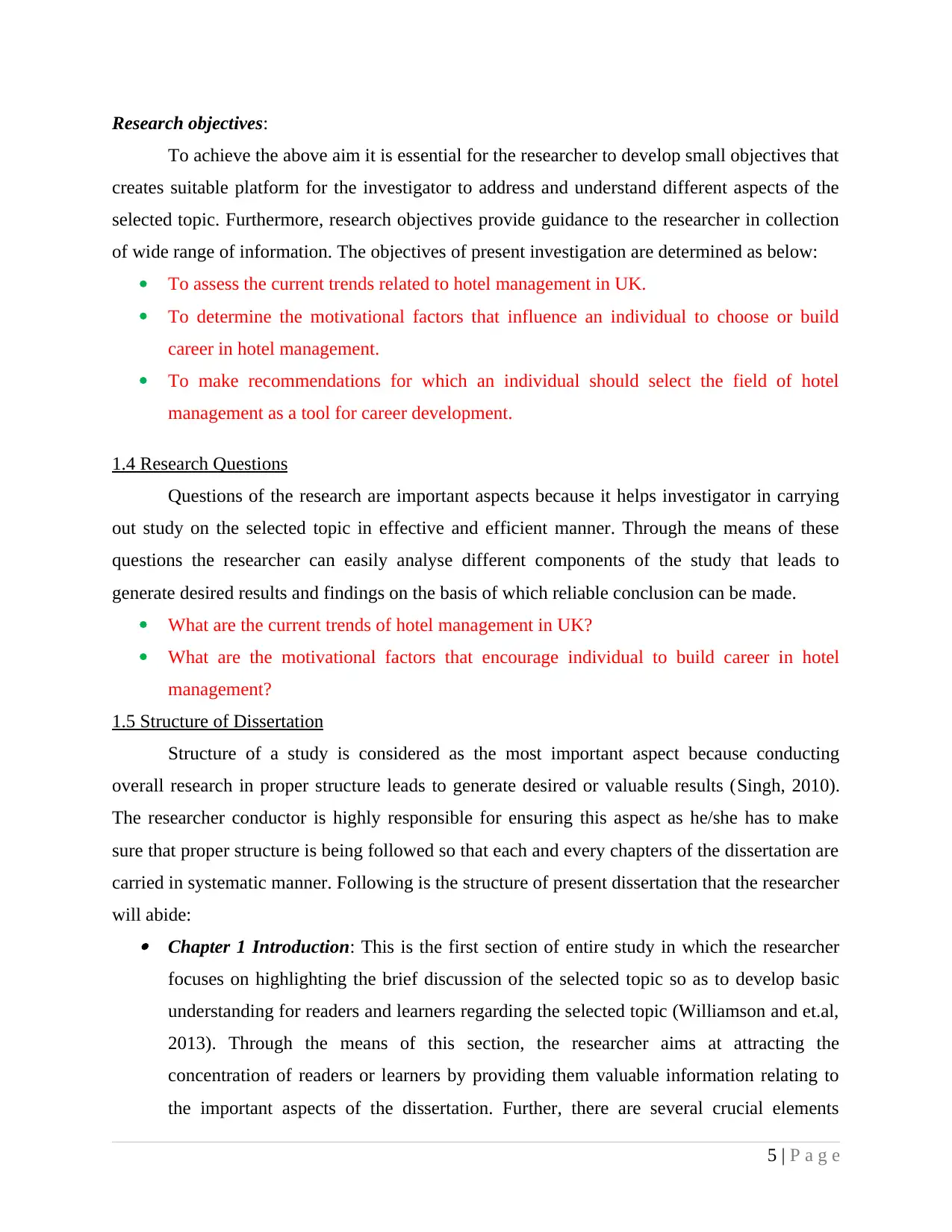
Research objectives:
To achieve the above aim it is essential for the researcher to develop small objectives that
creates suitable platform for the investigator to address and understand different aspects of the
selected topic. Furthermore, research objectives provide guidance to the researcher in collection
of wide range of information. The objectives of present investigation are determined as below:
To assess the current trends related to hotel management in UK.
To determine the motivational factors that influence an individual to choose or build
career in hotel management.
To make recommendations for which an individual should select the field of hotel
management as a tool for career development.
1.4 Research Questions
Questions of the research are important aspects because it helps investigator in carrying
out study on the selected topic in effective and efficient manner. Through the means of these
questions the researcher can easily analyse different components of the study that leads to
generate desired results and findings on the basis of which reliable conclusion can be made.
What are the current trends of hotel management in UK?
What are the motivational factors that encourage individual to build career in hotel
management?
1.5 Structure of Dissertation
Structure of a study is considered as the most important aspect because conducting
overall research in proper structure leads to generate desired or valuable results (Singh, 2010).
The researcher conductor is highly responsible for ensuring this aspect as he/she has to make
sure that proper structure is being followed so that each and every chapters of the dissertation are
carried in systematic manner. Following is the structure of present dissertation that the researcher
will abide: Chapter 1 Introduction: This is the first section of entire study in which the researcher
focuses on highlighting the brief discussion of the selected topic so as to develop basic
understanding for readers and learners regarding the selected topic (Williamson and et.al,
2013). Through the means of this section, the researcher aims at attracting the
concentration of readers or learners by providing them valuable information relating to
the important aspects of the dissertation. Further, there are several crucial elements
5 | P a g e
To achieve the above aim it is essential for the researcher to develop small objectives that
creates suitable platform for the investigator to address and understand different aspects of the
selected topic. Furthermore, research objectives provide guidance to the researcher in collection
of wide range of information. The objectives of present investigation are determined as below:
To assess the current trends related to hotel management in UK.
To determine the motivational factors that influence an individual to choose or build
career in hotel management.
To make recommendations for which an individual should select the field of hotel
management as a tool for career development.
1.4 Research Questions
Questions of the research are important aspects because it helps investigator in carrying
out study on the selected topic in effective and efficient manner. Through the means of these
questions the researcher can easily analyse different components of the study that leads to
generate desired results and findings on the basis of which reliable conclusion can be made.
What are the current trends of hotel management in UK?
What are the motivational factors that encourage individual to build career in hotel
management?
1.5 Structure of Dissertation
Structure of a study is considered as the most important aspect because conducting
overall research in proper structure leads to generate desired or valuable results (Singh, 2010).
The researcher conductor is highly responsible for ensuring this aspect as he/she has to make
sure that proper structure is being followed so that each and every chapters of the dissertation are
carried in systematic manner. Following is the structure of present dissertation that the researcher
will abide: Chapter 1 Introduction: This is the first section of entire study in which the researcher
focuses on highlighting the brief discussion of the selected topic so as to develop basic
understanding for readers and learners regarding the selected topic (Williamson and et.al,
2013). Through the means of this section, the researcher aims at attracting the
concentration of readers or learners by providing them valuable information relating to
the important aspects of the dissertation. Further, there are several crucial elements
5 | P a g e
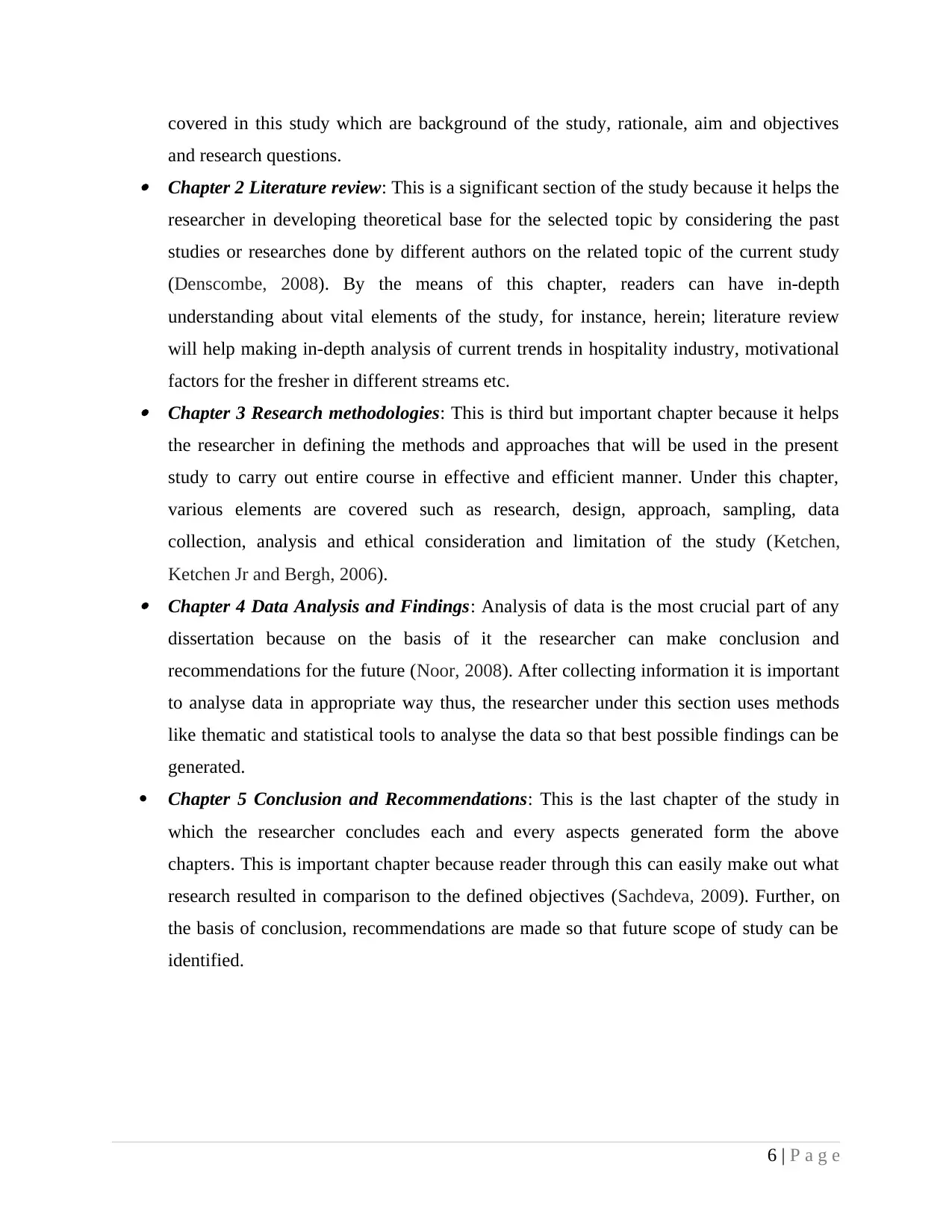
covered in this study which are background of the study, rationale, aim and objectives
and research questions. Chapter 2 Literature review: This is a significant section of the study because it helps the
researcher in developing theoretical base for the selected topic by considering the past
studies or researches done by different authors on the related topic of the current study
(Denscombe, 2008). By the means of this chapter, readers can have in-depth
understanding about vital elements of the study, for instance, herein; literature review
will help making in-depth analysis of current trends in hospitality industry, motivational
factors for the fresher in different streams etc. Chapter 3 Research methodologies: This is third but important chapter because it helps
the researcher in defining the methods and approaches that will be used in the present
study to carry out entire course in effective and efficient manner. Under this chapter,
various elements are covered such as research, design, approach, sampling, data
collection, analysis and ethical consideration and limitation of the study (Ketchen,
Ketchen Jr and Bergh, 2006). Chapter 4 Data Analysis and Findings: Analysis of data is the most crucial part of any
dissertation because on the basis of it the researcher can make conclusion and
recommendations for the future (Noor, 2008). After collecting information it is important
to analyse data in appropriate way thus, the researcher under this section uses methods
like thematic and statistical tools to analyse the data so that best possible findings can be
generated.
Chapter 5 Conclusion and Recommendations: This is the last chapter of the study in
which the researcher concludes each and every aspects generated form the above
chapters. This is important chapter because reader through this can easily make out what
research resulted in comparison to the defined objectives (Sachdeva, 2009). Further, on
the basis of conclusion, recommendations are made so that future scope of study can be
identified.
6 | P a g e
and research questions. Chapter 2 Literature review: This is a significant section of the study because it helps the
researcher in developing theoretical base for the selected topic by considering the past
studies or researches done by different authors on the related topic of the current study
(Denscombe, 2008). By the means of this chapter, readers can have in-depth
understanding about vital elements of the study, for instance, herein; literature review
will help making in-depth analysis of current trends in hospitality industry, motivational
factors for the fresher in different streams etc. Chapter 3 Research methodologies: This is third but important chapter because it helps
the researcher in defining the methods and approaches that will be used in the present
study to carry out entire course in effective and efficient manner. Under this chapter,
various elements are covered such as research, design, approach, sampling, data
collection, analysis and ethical consideration and limitation of the study (Ketchen,
Ketchen Jr and Bergh, 2006). Chapter 4 Data Analysis and Findings: Analysis of data is the most crucial part of any
dissertation because on the basis of it the researcher can make conclusion and
recommendations for the future (Noor, 2008). After collecting information it is important
to analyse data in appropriate way thus, the researcher under this section uses methods
like thematic and statistical tools to analyse the data so that best possible findings can be
generated.
Chapter 5 Conclusion and Recommendations: This is the last chapter of the study in
which the researcher concludes each and every aspects generated form the above
chapters. This is important chapter because reader through this can easily make out what
research resulted in comparison to the defined objectives (Sachdeva, 2009). Further, on
the basis of conclusion, recommendations are made so that future scope of study can be
identified.
6 | P a g e
⊘ This is a preview!⊘
Do you want full access?
Subscribe today to unlock all pages.

Trusted by 1+ million students worldwide
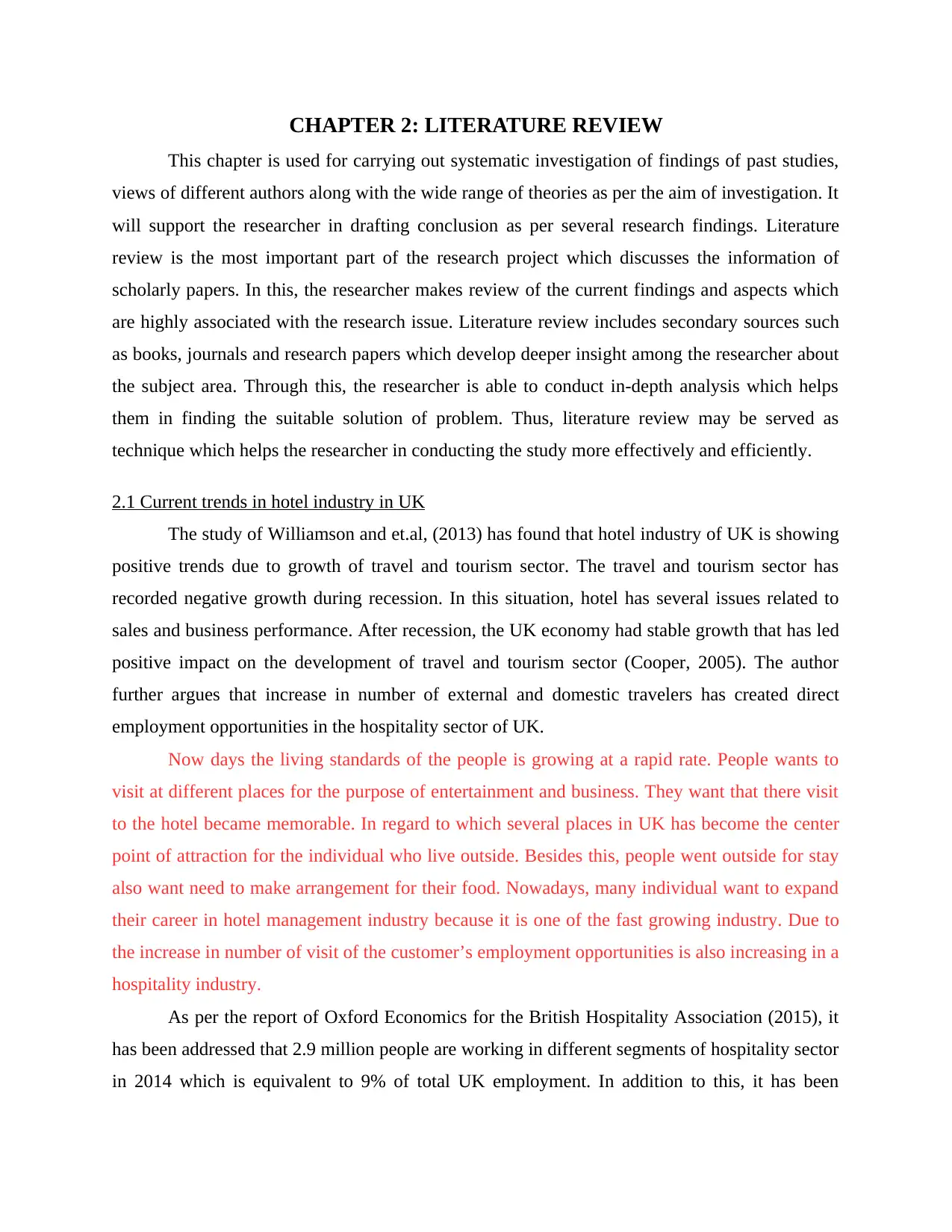
CHAPTER 2: LITERATURE REVIEW
This chapter is used for carrying out systematic investigation of findings of past studies,
views of different authors along with the wide range of theories as per the aim of investigation. It
will support the researcher in drafting conclusion as per several research findings. Literature
review is the most important part of the research project which discusses the information of
scholarly papers. In this, the researcher makes review of the current findings and aspects which
are highly associated with the research issue. Literature review includes secondary sources such
as books, journals and research papers which develop deeper insight among the researcher about
the subject area. Through this, the researcher is able to conduct in-depth analysis which helps
them in finding the suitable solution of problem. Thus, literature review may be served as
technique which helps the researcher in conducting the study more effectively and efficiently.
2.1 Current trends in hotel industry in UK
The study of Williamson and et.al, (2013) has found that hotel industry of UK is showing
positive trends due to growth of travel and tourism sector. The travel and tourism sector has
recorded negative growth during recession. In this situation, hotel has several issues related to
sales and business performance. After recession, the UK economy had stable growth that has led
positive impact on the development of travel and tourism sector (Cooper, 2005). The author
further argues that increase in number of external and domestic travelers has created direct
employment opportunities in the hospitality sector of UK.
Now days the living standards of the people is growing at a rapid rate. People wants to
visit at different places for the purpose of entertainment and business. They want that there visit
to the hotel became memorable. In regard to which several places in UK has become the center
point of attraction for the individual who live outside. Besides this, people went outside for stay
also want need to make arrangement for their food. Nowadays, many individual want to expand
their career in hotel management industry because it is one of the fast growing industry. Due to
the increase in number of visit of the customer’s employment opportunities is also increasing in a
hospitality industry.
As per the report of Oxford Economics for the British Hospitality Association (2015), it
has been addressed that 2.9 million people are working in different segments of hospitality sector
in 2014 which is equivalent to 9% of total UK employment. In addition to this, it has been
This chapter is used for carrying out systematic investigation of findings of past studies,
views of different authors along with the wide range of theories as per the aim of investigation. It
will support the researcher in drafting conclusion as per several research findings. Literature
review is the most important part of the research project which discusses the information of
scholarly papers. In this, the researcher makes review of the current findings and aspects which
are highly associated with the research issue. Literature review includes secondary sources such
as books, journals and research papers which develop deeper insight among the researcher about
the subject area. Through this, the researcher is able to conduct in-depth analysis which helps
them in finding the suitable solution of problem. Thus, literature review may be served as
technique which helps the researcher in conducting the study more effectively and efficiently.
2.1 Current trends in hotel industry in UK
The study of Williamson and et.al, (2013) has found that hotel industry of UK is showing
positive trends due to growth of travel and tourism sector. The travel and tourism sector has
recorded negative growth during recession. In this situation, hotel has several issues related to
sales and business performance. After recession, the UK economy had stable growth that has led
positive impact on the development of travel and tourism sector (Cooper, 2005). The author
further argues that increase in number of external and domestic travelers has created direct
employment opportunities in the hospitality sector of UK.
Now days the living standards of the people is growing at a rapid rate. People wants to
visit at different places for the purpose of entertainment and business. They want that there visit
to the hotel became memorable. In regard to which several places in UK has become the center
point of attraction for the individual who live outside. Besides this, people went outside for stay
also want need to make arrangement for their food. Nowadays, many individual want to expand
their career in hotel management industry because it is one of the fast growing industry. Due to
the increase in number of visit of the customer’s employment opportunities is also increasing in a
hospitality industry.
As per the report of Oxford Economics for the British Hospitality Association (2015), it
has been addressed that 2.9 million people are working in different segments of hospitality sector
in 2014 which is equivalent to 9% of total UK employment. In addition to this, it has been
Paraphrase This Document
Need a fresh take? Get an instant paraphrase of this document with our AI Paraphraser
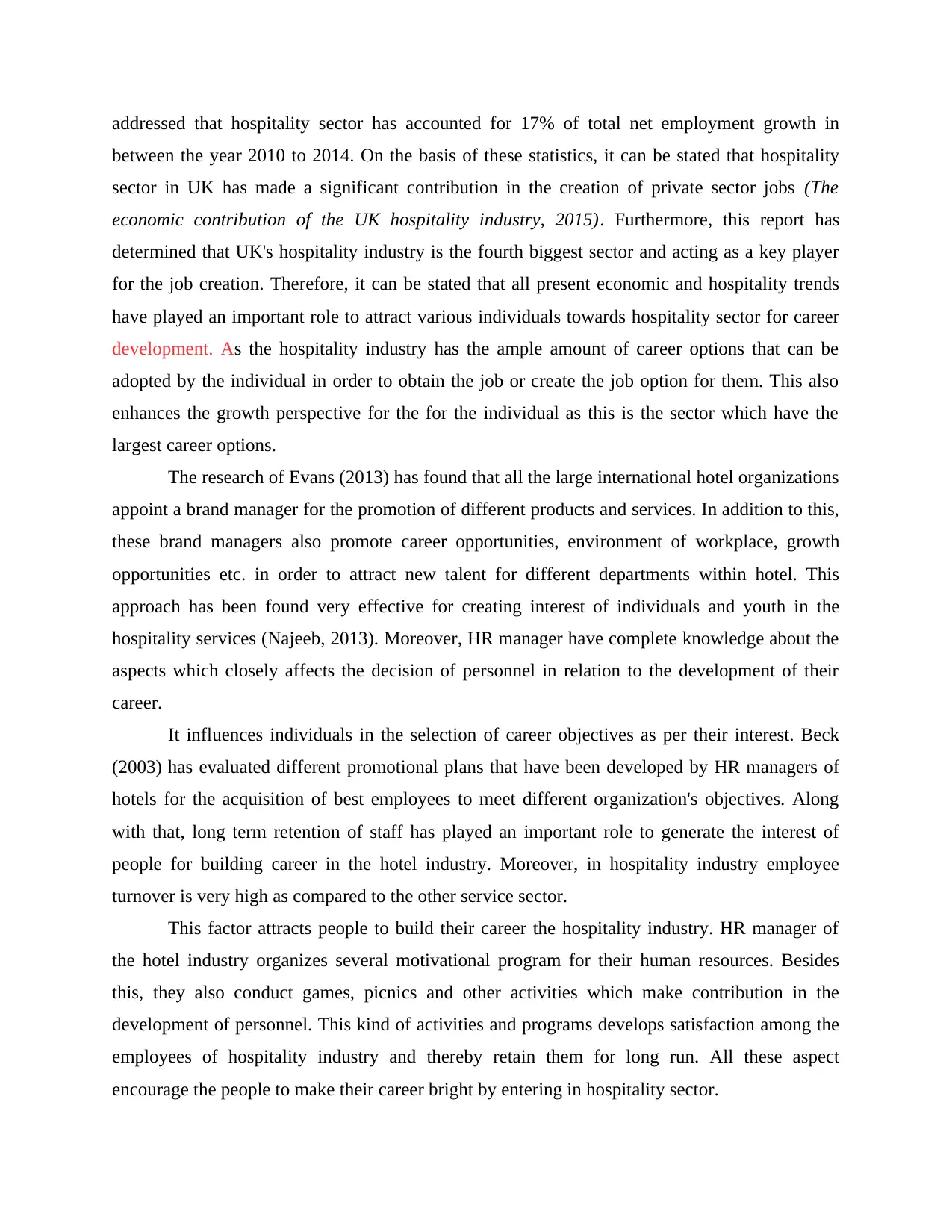
addressed that hospitality sector has accounted for 17% of total net employment growth in
between the year 2010 to 2014. On the basis of these statistics, it can be stated that hospitality
sector in UK has made a significant contribution in the creation of private sector jobs (The
economic contribution of the UK hospitality industry, 2015). Furthermore, this report has
determined that UK's hospitality industry is the fourth biggest sector and acting as a key player
for the job creation. Therefore, it can be stated that all present economic and hospitality trends
have played an important role to attract various individuals towards hospitality sector for career
development. As the hospitality industry has the ample amount of career options that can be
adopted by the individual in order to obtain the job or create the job option for them. This also
enhances the growth perspective for the for the individual as this is the sector which have the
largest career options.
The research of Evans (2013) has found that all the large international hotel organizations
appoint a brand manager for the promotion of different products and services. In addition to this,
these brand managers also promote career opportunities, environment of workplace, growth
opportunities etc. in order to attract new talent for different departments within hotel. This
approach has been found very effective for creating interest of individuals and youth in the
hospitality services (Najeeb, 2013). Moreover, HR manager have complete knowledge about the
aspects which closely affects the decision of personnel in relation to the development of their
career.
It influences individuals in the selection of career objectives as per their interest. Beck
(2003) has evaluated different promotional plans that have been developed by HR managers of
hotels for the acquisition of best employees to meet different organization's objectives. Along
with that, long term retention of staff has played an important role to generate the interest of
people for building career in the hotel industry. Moreover, in hospitality industry employee
turnover is very high as compared to the other service sector.
This factor attracts people to build their career the hospitality industry. HR manager of
the hotel industry organizes several motivational program for their human resources. Besides
this, they also conduct games, picnics and other activities which make contribution in the
development of personnel. This kind of activities and programs develops satisfaction among the
employees of hospitality industry and thereby retain them for long run. All these aspect
encourage the people to make their career bright by entering in hospitality sector.
between the year 2010 to 2014. On the basis of these statistics, it can be stated that hospitality
sector in UK has made a significant contribution in the creation of private sector jobs (The
economic contribution of the UK hospitality industry, 2015). Furthermore, this report has
determined that UK's hospitality industry is the fourth biggest sector and acting as a key player
for the job creation. Therefore, it can be stated that all present economic and hospitality trends
have played an important role to attract various individuals towards hospitality sector for career
development. As the hospitality industry has the ample amount of career options that can be
adopted by the individual in order to obtain the job or create the job option for them. This also
enhances the growth perspective for the for the individual as this is the sector which have the
largest career options.
The research of Evans (2013) has found that all the large international hotel organizations
appoint a brand manager for the promotion of different products and services. In addition to this,
these brand managers also promote career opportunities, environment of workplace, growth
opportunities etc. in order to attract new talent for different departments within hotel. This
approach has been found very effective for creating interest of individuals and youth in the
hospitality services (Najeeb, 2013). Moreover, HR manager have complete knowledge about the
aspects which closely affects the decision of personnel in relation to the development of their
career.
It influences individuals in the selection of career objectives as per their interest. Beck
(2003) has evaluated different promotional plans that have been developed by HR managers of
hotels for the acquisition of best employees to meet different organization's objectives. Along
with that, long term retention of staff has played an important role to generate the interest of
people for building career in the hotel industry. Moreover, in hospitality industry employee
turnover is very high as compared to the other service sector.
This factor attracts people to build their career the hospitality industry. HR manager of
the hotel industry organizes several motivational program for their human resources. Besides
this, they also conduct games, picnics and other activities which make contribution in the
development of personnel. This kind of activities and programs develops satisfaction among the
employees of hospitality industry and thereby retain them for long run. All these aspect
encourage the people to make their career bright by entering in hospitality sector.
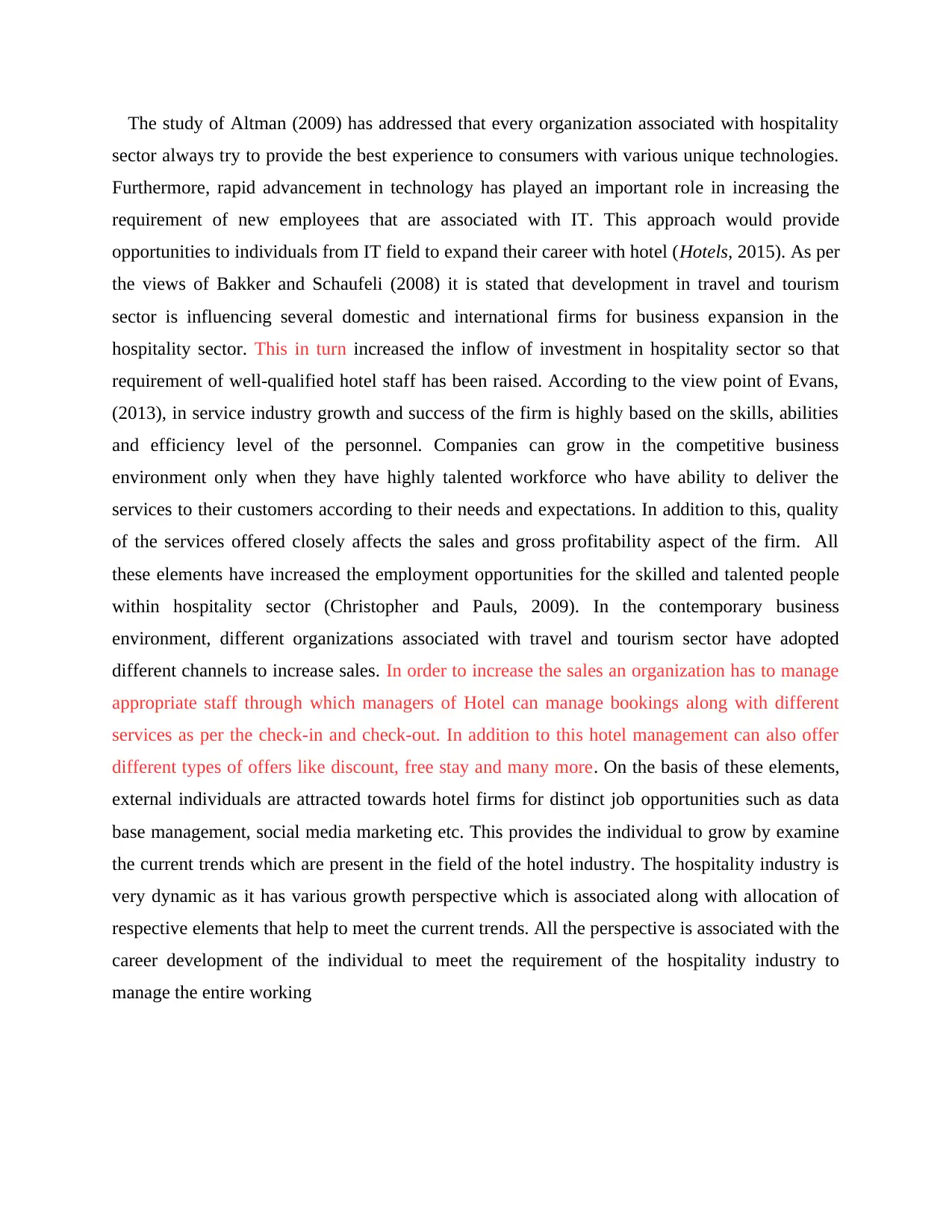
The study of Altman (2009) has addressed that every organization associated with hospitality
sector always try to provide the best experience to consumers with various unique technologies.
Furthermore, rapid advancement in technology has played an important role in increasing the
requirement of new employees that are associated with IT. This approach would provide
opportunities to individuals from IT field to expand their career with hotel (Hotels, 2015). As per
the views of Bakker and Schaufeli (2008) it is stated that development in travel and tourism
sector is influencing several domestic and international firms for business expansion in the
hospitality sector. This in turn increased the inflow of investment in hospitality sector so that
requirement of well-qualified hotel staff has been raised. According to the view point of Evans,
(2013), in service industry growth and success of the firm is highly based on the skills, abilities
and efficiency level of the personnel. Companies can grow in the competitive business
environment only when they have highly talented workforce who have ability to deliver the
services to their customers according to their needs and expectations. In addition to this, quality
of the services offered closely affects the sales and gross profitability aspect of the firm. All
these elements have increased the employment opportunities for the skilled and talented people
within hospitality sector (Christopher and Pauls, 2009). In the contemporary business
environment, different organizations associated with travel and tourism sector have adopted
different channels to increase sales. In order to increase the sales an organization has to manage
appropriate staff through which managers of Hotel can manage bookings along with different
services as per the check-in and check-out. In addition to this hotel management can also offer
different types of offers like discount, free stay and many more. On the basis of these elements,
external individuals are attracted towards hotel firms for distinct job opportunities such as data
base management, social media marketing etc. This provides the individual to grow by examine
the current trends which are present in the field of the hotel industry. The hospitality industry is
very dynamic as it has various growth perspective which is associated along with allocation of
respective elements that help to meet the current trends. All the perspective is associated with the
career development of the individual to meet the requirement of the hospitality industry to
manage the entire working
sector always try to provide the best experience to consumers with various unique technologies.
Furthermore, rapid advancement in technology has played an important role in increasing the
requirement of new employees that are associated with IT. This approach would provide
opportunities to individuals from IT field to expand their career with hotel (Hotels, 2015). As per
the views of Bakker and Schaufeli (2008) it is stated that development in travel and tourism
sector is influencing several domestic and international firms for business expansion in the
hospitality sector. This in turn increased the inflow of investment in hospitality sector so that
requirement of well-qualified hotel staff has been raised. According to the view point of Evans,
(2013), in service industry growth and success of the firm is highly based on the skills, abilities
and efficiency level of the personnel. Companies can grow in the competitive business
environment only when they have highly talented workforce who have ability to deliver the
services to their customers according to their needs and expectations. In addition to this, quality
of the services offered closely affects the sales and gross profitability aspect of the firm. All
these elements have increased the employment opportunities for the skilled and talented people
within hospitality sector (Christopher and Pauls, 2009). In the contemporary business
environment, different organizations associated with travel and tourism sector have adopted
different channels to increase sales. In order to increase the sales an organization has to manage
appropriate staff through which managers of Hotel can manage bookings along with different
services as per the check-in and check-out. In addition to this hotel management can also offer
different types of offers like discount, free stay and many more. On the basis of these elements,
external individuals are attracted towards hotel firms for distinct job opportunities such as data
base management, social media marketing etc. This provides the individual to grow by examine
the current trends which are present in the field of the hotel industry. The hospitality industry is
very dynamic as it has various growth perspective which is associated along with allocation of
respective elements that help to meet the current trends. All the perspective is associated with the
career development of the individual to meet the requirement of the hospitality industry to
manage the entire working
⊘ This is a preview!⊘
Do you want full access?
Subscribe today to unlock all pages.

Trusted by 1+ million students worldwide
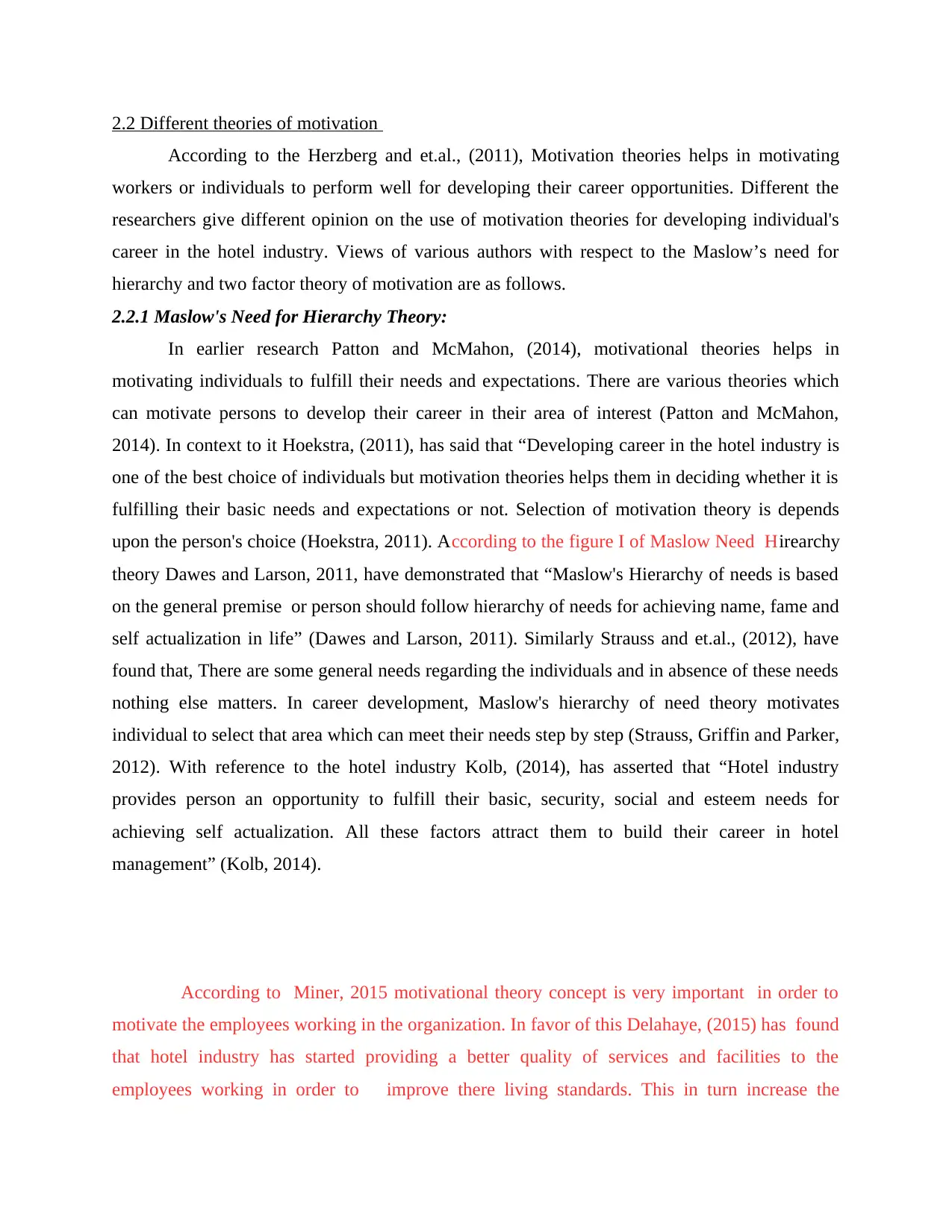
2.2 Different theories of motivation
According to the Herzberg and et.al., (2011), Motivation theories helps in motivating
workers or individuals to perform well for developing their career opportunities. Different the
researchers give different opinion on the use of motivation theories for developing individual's
career in the hotel industry. Views of various authors with respect to the Maslow’s need for
hierarchy and two factor theory of motivation are as follows.
2.2.1 Maslow's Need for Hierarchy Theory:
In earlier research Patton and McMahon, (2014), motivational theories helps in
motivating individuals to fulfill their needs and expectations. There are various theories which
can motivate persons to develop their career in their area of interest (Patton and McMahon,
2014). In context to it Hoekstra, (2011), has said that “Developing career in the hotel industry is
one of the best choice of individuals but motivation theories helps them in deciding whether it is
fulfilling their basic needs and expectations or not. Selection of motivation theory is depends
upon the person's choice (Hoekstra, 2011). According to the figure I of Maslow Need Hirearchy
theory Dawes and Larson, 2011, have demonstrated that “Maslow's Hierarchy of needs is based
on the general premise or person should follow hierarchy of needs for achieving name, fame and
self actualization in life” (Dawes and Larson, 2011). Similarly Strauss and et.al., (2012), have
found that, There are some general needs regarding the individuals and in absence of these needs
nothing else matters. In career development, Maslow's hierarchy of need theory motivates
individual to select that area which can meet their needs step by step (Strauss, Griffin and Parker,
2012). With reference to the hotel industry Kolb, (2014), has asserted that “Hotel industry
provides person an opportunity to fulfill their basic, security, social and esteem needs for
achieving self actualization. All these factors attract them to build their career in hotel
management” (Kolb, 2014).
According to Miner, 2015 motivational theory concept is very important in order to
motivate the employees working in the organization. In favor of this Delahaye, (2015) has found
that hotel industry has started providing a better quality of services and facilities to the
employees working in order to improve there living standards. This in turn increase the
According to the Herzberg and et.al., (2011), Motivation theories helps in motivating
workers or individuals to perform well for developing their career opportunities. Different the
researchers give different opinion on the use of motivation theories for developing individual's
career in the hotel industry. Views of various authors with respect to the Maslow’s need for
hierarchy and two factor theory of motivation are as follows.
2.2.1 Maslow's Need for Hierarchy Theory:
In earlier research Patton and McMahon, (2014), motivational theories helps in
motivating individuals to fulfill their needs and expectations. There are various theories which
can motivate persons to develop their career in their area of interest (Patton and McMahon,
2014). In context to it Hoekstra, (2011), has said that “Developing career in the hotel industry is
one of the best choice of individuals but motivation theories helps them in deciding whether it is
fulfilling their basic needs and expectations or not. Selection of motivation theory is depends
upon the person's choice (Hoekstra, 2011). According to the figure I of Maslow Need Hirearchy
theory Dawes and Larson, 2011, have demonstrated that “Maslow's Hierarchy of needs is based
on the general premise or person should follow hierarchy of needs for achieving name, fame and
self actualization in life” (Dawes and Larson, 2011). Similarly Strauss and et.al., (2012), have
found that, There are some general needs regarding the individuals and in absence of these needs
nothing else matters. In career development, Maslow's hierarchy of need theory motivates
individual to select that area which can meet their needs step by step (Strauss, Griffin and Parker,
2012). With reference to the hotel industry Kolb, (2014), has asserted that “Hotel industry
provides person an opportunity to fulfill their basic, security, social and esteem needs for
achieving self actualization. All these factors attract them to build their career in hotel
management” (Kolb, 2014).
According to Miner, 2015 motivational theory concept is very important in order to
motivate the employees working in the organization. In favor of this Delahaye, (2015) has found
that hotel industry has started providing a better quality of services and facilities to the
employees working in order to improve there living standards. This in turn increase the
Paraphrase This Document
Need a fresh take? Get an instant paraphrase of this document with our AI Paraphraser
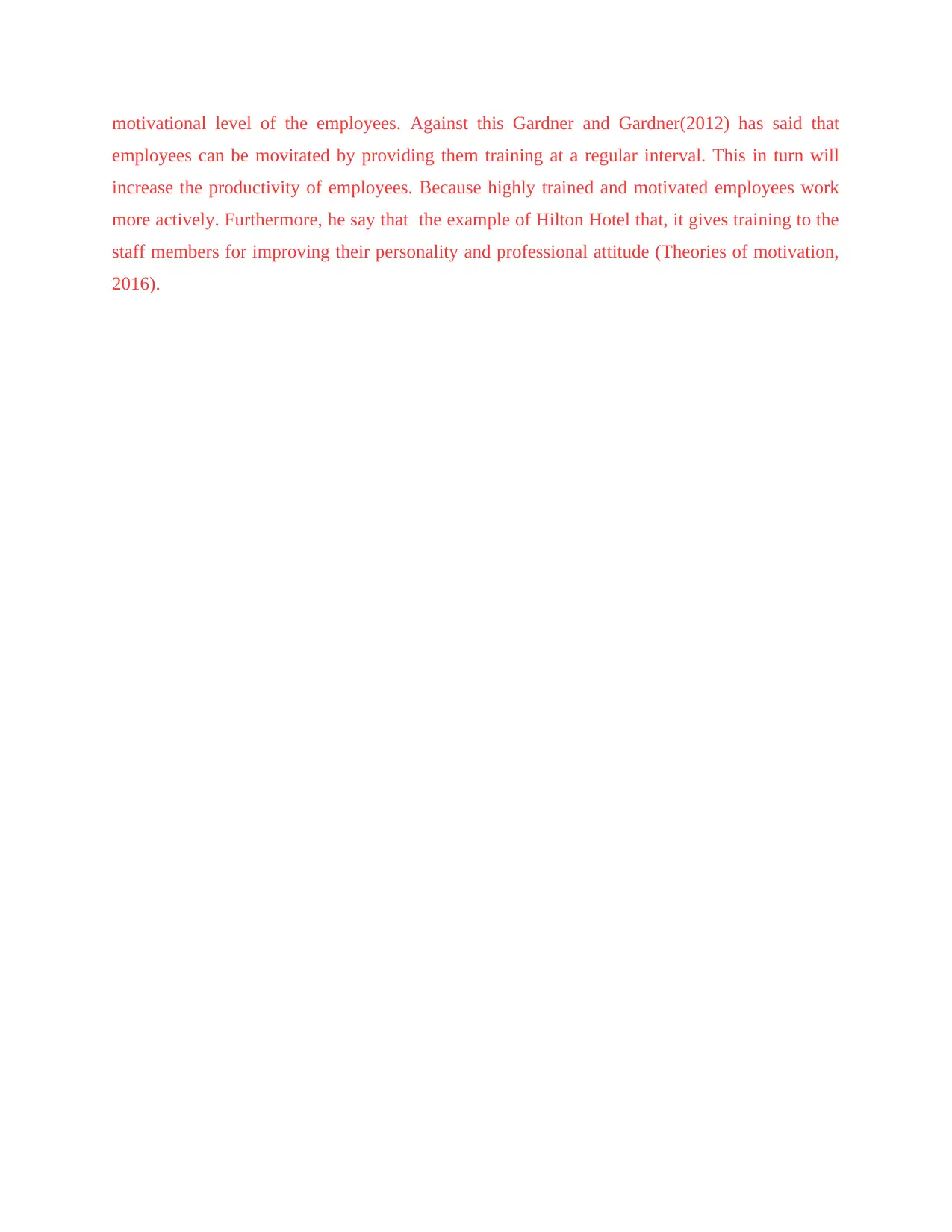
motivational level of the employees. Against this Gardner and Gardner(2012) has said that
employees can be movitated by providing them training at a regular interval. This in turn will
increase the productivity of employees. Because highly trained and motivated employees work
more actively. Furthermore, he say that the example of Hilton Hotel that, it gives training to the
staff members for improving their personality and professional attitude (Theories of motivation,
2016).
employees can be movitated by providing them training at a regular interval. This in turn will
increase the productivity of employees. Because highly trained and motivated employees work
more actively. Furthermore, he say that the example of Hilton Hotel that, it gives training to the
staff members for improving their personality and professional attitude (Theories of motivation,
2016).
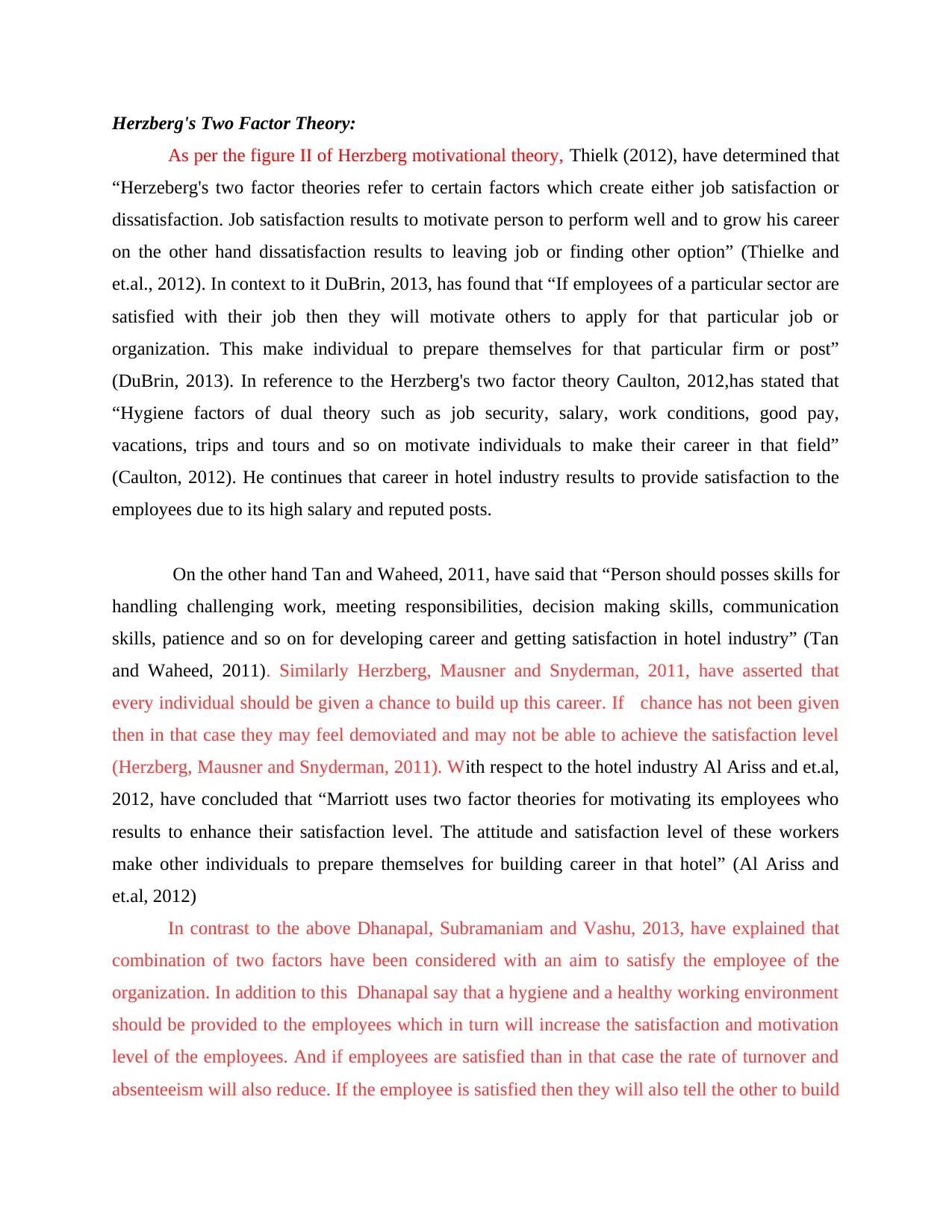
Herzberg's Two Factor Theory:
As per the figure II of Herzberg motivational theory, Thielk (2012), have determined that
“Herzeberg's two factor theories refer to certain factors which create either job satisfaction or
dissatisfaction. Job satisfaction results to motivate person to perform well and to grow his career
on the other hand dissatisfaction results to leaving job or finding other option” (Thielke and
et.al., 2012). In context to it DuBrin, 2013, has found that “If employees of a particular sector are
satisfied with their job then they will motivate others to apply for that particular job or
organization. This make individual to prepare themselves for that particular firm or post”
(DuBrin, 2013). In reference to the Herzberg's two factor theory Caulton, 2012,has stated that
“Hygiene factors of dual theory such as job security, salary, work conditions, good pay,
vacations, trips and tours and so on motivate individuals to make their career in that field”
(Caulton, 2012). He continues that career in hotel industry results to provide satisfaction to the
employees due to its high salary and reputed posts.
On the other hand Tan and Waheed, 2011, have said that “Person should posses skills for
handling challenging work, meeting responsibilities, decision making skills, communication
skills, patience and so on for developing career and getting satisfaction in hotel industry” (Tan
and Waheed, 2011). Similarly Herzberg, Mausner and Snyderman, 2011, have asserted that
every individual should be given a chance to build up this career. If chance has not been given
then in that case they may feel demoviated and may not be able to achieve the satisfaction level
(Herzberg, Mausner and Snyderman, 2011). With respect to the hotel industry Al Ariss and et.al,
2012, have concluded that “Marriott uses two factor theories for motivating its employees who
results to enhance their satisfaction level. The attitude and satisfaction level of these workers
make other individuals to prepare themselves for building career in that hotel” (Al Ariss and
et.al, 2012)
In contrast to the above Dhanapal, Subramaniam and Vashu, 2013, have explained that
combination of two factors have been considered with an aim to satisfy the employee of the
organization. In addition to this Dhanapal say that a hygiene and a healthy working environment
should be provided to the employees which in turn will increase the satisfaction and motivation
level of the employees. And if employees are satisfied than in that case the rate of turnover and
absenteeism will also reduce. If the employee is satisfied then they will also tell the other to build
As per the figure II of Herzberg motivational theory, Thielk (2012), have determined that
“Herzeberg's two factor theories refer to certain factors which create either job satisfaction or
dissatisfaction. Job satisfaction results to motivate person to perform well and to grow his career
on the other hand dissatisfaction results to leaving job or finding other option” (Thielke and
et.al., 2012). In context to it DuBrin, 2013, has found that “If employees of a particular sector are
satisfied with their job then they will motivate others to apply for that particular job or
organization. This make individual to prepare themselves for that particular firm or post”
(DuBrin, 2013). In reference to the Herzberg's two factor theory Caulton, 2012,has stated that
“Hygiene factors of dual theory such as job security, salary, work conditions, good pay,
vacations, trips and tours and so on motivate individuals to make their career in that field”
(Caulton, 2012). He continues that career in hotel industry results to provide satisfaction to the
employees due to its high salary and reputed posts.
On the other hand Tan and Waheed, 2011, have said that “Person should posses skills for
handling challenging work, meeting responsibilities, decision making skills, communication
skills, patience and so on for developing career and getting satisfaction in hotel industry” (Tan
and Waheed, 2011). Similarly Herzberg, Mausner and Snyderman, 2011, have asserted that
every individual should be given a chance to build up this career. If chance has not been given
then in that case they may feel demoviated and may not be able to achieve the satisfaction level
(Herzberg, Mausner and Snyderman, 2011). With respect to the hotel industry Al Ariss and et.al,
2012, have concluded that “Marriott uses two factor theories for motivating its employees who
results to enhance their satisfaction level. The attitude and satisfaction level of these workers
make other individuals to prepare themselves for building career in that hotel” (Al Ariss and
et.al, 2012)
In contrast to the above Dhanapal, Subramaniam and Vashu, 2013, have explained that
combination of two factors have been considered with an aim to satisfy the employee of the
organization. In addition to this Dhanapal say that a hygiene and a healthy working environment
should be provided to the employees which in turn will increase the satisfaction and motivation
level of the employees. And if employees are satisfied than in that case the rate of turnover and
absenteeism will also reduce. If the employee is satisfied then they will also tell the other to build
⊘ This is a preview!⊘
Do you want full access?
Subscribe today to unlock all pages.

Trusted by 1+ million students worldwide
1 out of 24
Related Documents
Your All-in-One AI-Powered Toolkit for Academic Success.
+13062052269
info@desklib.com
Available 24*7 on WhatsApp / Email
![[object Object]](/_next/static/media/star-bottom.7253800d.svg)
Unlock your academic potential
Copyright © 2020–2026 A2Z Services. All Rights Reserved. Developed and managed by ZUCOL.





